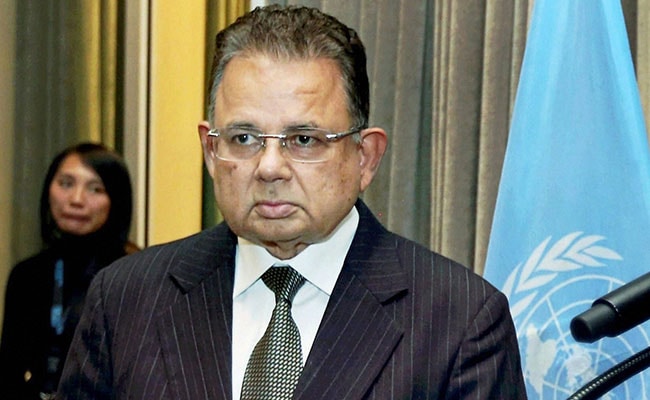
India's Dalveer Bhandari, 70, has been re-elected to the International Court of Justice (ICJ), winning the last of five seats for which elections were held, after Britain pulled out its candidate Christopher Greenwood before the 12th round of voting. For 11 rounds, the two were locked in a stalemate with Justice Bhandari getting majority support in the United Nations General Assembly and Justice Greenwood in the UN Security Council, both of which vote in elections to the world court. Prime Minister Narendra Modi has called it "a proud moment for us."
Here is your 10-point-guide to the ICJ elections:
The Prime Minister congratulated Justice Dalveer Bhandari in tweets and Foreign Minister Sushma Swaraj and her team for "their untiring efforts that have led to India's re-election to the ICJ," also thanking members of the two UN chambers for their support. "Vande Matram - India wins election to the International Court of Justice. Jai Hind (sic)," Ms Swaraj tweeted.
One-third of the ICJ's 15-member bench, or five judges, is elected every three years for a nine-year term. Elections are held separately but simultaneously in the United Nations General Assembly (UNGA) and the UN Security Council in New York. To win, a candidate needs to get a majority in both chambers.
This is the first time since the ICJ, based in The Hague, Netherlands, was established in 1945 that there will be no British judge. "It is wrong to continue to take up the valuable time of the Security Council and the UN General Assembly with further rounds of election," Britain's Ambassador to the UN Matthew Rycroft said as he announced that Justice Greenwood was pulling out.
Once the British candidate withdrew, both the UNGA and the security council formally voted to elect Justice Dalveer Bhandari, a former Supreme Court judge. He received 183 out of 193 votes in the General Assembly and all the 15 votes in the Security Council.
Syed Akbaruddin, Permanent Representative of India to the United Nations, described Justice Dalveer Bhandari's re-election as a "victory for emerging new India," and an "acknowledgement that the world now needs to make space for an asserting India."
He told NDTV that huge diplomatic effort was made by the political leadership in India, with Ms Swaraj calling several world leaders. "There was a crucial meet before the vote. We put forward our view and stuck to it. It was apparent that vote will be in our favour. We are grateful that the UK judge recused and recognised that the Indian judge was doing good in UNGA," Mr Akbaruddin said.
Mr Rycroft congratulated Justice Dalveer Bhandari on being re-elected, saying, "If the UK could not win in this run-off, then we are pleased that it is a close friend like India that has done so instead. We will continue to cooperate closely with India, here in the United Nations and globally."
On November 9, the UNGA and Security Council members had elected judges to four of the five seats, with India and Britain competing for the fifth. Repeatedly over 11 rounds, the UNGA, made up of 193 countries, voted overwhelmingly for Dalveer Bhandari, while the 15-member Security Council voted 9 to 5 in favour of Britain, which is one of five permanent members of the security council. India is currently not a member.
In all previous such contests, the candidate who got a majority in the General Assembly was eventually elected, but Britain was at one point seen to be pushing for a joint conference mechanism, never resorted to since the UN was established and only once before that.
A joint conference would've involved picking three countries each from the the UNGA and the UNSC, which would then choose one candidate. Critics had warned that such a move would be "dirty politics" and other members of the powerful UN Security Council were reportedly uneasy, aware of the long-term implications of a move to ignore the voice of the majority of the United Nations General Assembly.

